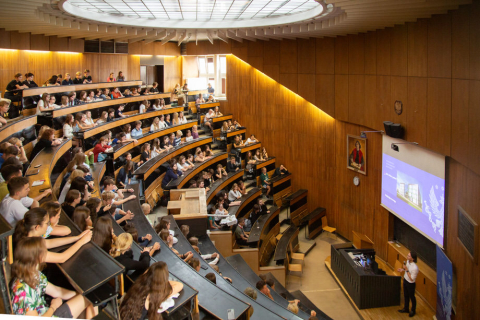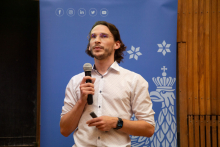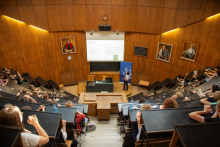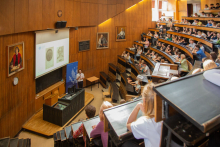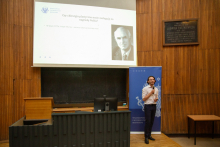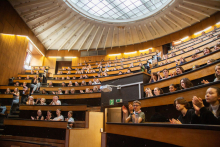– It is my great pleasure to open this series of patronage lectures for high school students – doctor Paskal said. – This is the perfect time to show you some diverse perspectives, and plastic surgery will greatly expand your thinking horizons, both in the world of science and in the world of surgery itself, which are then engaged by other fields of medicine.
What is plastic surgery?
The word “plastic” comes from Greek and means ‘to form, to sculpt’. A plastic surgeon operates in human tissues, creating something new and at the same time restoring something that was already there. Plastic surgeons are not limited or strongly bound to any specific area of the body; they are able to reconstruct a face, breast, but also such organs as the urethra.
The speaker noted that with the extension of the knowledge of anatomy on microscopic level of the 1980s and the development of microsurgical techniques for supplying blood to tissues, surgeons became able to transfer tissues from point A to point B. This, in turn, opened the way for repairing defects which could not be remedied before. At the moment, plastic surgeons can use over 300 graft for reconstruction of losses, including skin grafts, skin/muscle grafts, skin/fat grafts, or bone/skin grafts.
Doctor Paskal: – We have lots of locations in our bodies that we may sacrifice for the greater good, to restore a more important organ without a major loss in the donor area. Therefore, transplanting a bone fragment from a leg to a mandible is not such a serious issue today, where it used to be completely impossible. Naturally, it requires the right background, knowledge, equipment and other things that determine whether a procedure will be a success. But this is something we are now offering our patients.
When should a patient be referred to a plastic surgeon
There are no nationwide statistics about the procedures most commonly carried out by plastic surgeons in Poland. But the list of their activities is long and not limited to aesthetic procedures, as it is commonly perceived. Plastic surgeons restore such organs as breasts, eyelids, extremities, they deal with resection of cancers of the skin and integuments, treatment of extensive wounds, revision of scars, hand surgery, burn surgery, replantation surgery, lymphedema surgery, or dressing tissue losses after injuries.
Doctor Paskal presented the spectrum of plastic surgeons’ activity on specific examples. He talked about a patient who neglected a skin cancer that developed within the medial eye angle, next to the upper and lower eyelid and the tear duct. He required a major resection, but it was not the end of it - the eyelid needed to be restored and followed by skin grafting. He also talked about a patient requiring a plastic surgeon’s intervention because of neglected diabetes, a non-surgical disease that led to the development of ulceration on the ankle and consequently to joint damage. The surgical procedure involved acquisition of a large flap from the shin, reversal of the tissue around the axis of the vessel and application to the loss. This complicated procedure enabled the patient to walk again.
The speaker further mentioned the possibilities of advanced plastic surgery - complex tissue transplants, for example in the face, typically from deceased donors. He recapitulated the first full face transplant in the world, done by professor Maria Siemionow at a U.S. clinic, and the first face transplant in Poland, which was done in Gliwice.
– Unfortunately, when our patients come to us, it is too late, and sometimes it is too late to restore certain things – doctor Paskal said, warning everyone to see a doctor immediately if they have a wound that would not heal for several weeks.
Here is what doctor Paskal said about aesthetic surgery: – Learning how to operate on the human body, how to help people in really severe cases, is the only thing that gives you the right tools to help with less serious issues, or rather with making good things better – doctor Paskal emphasized. Aesthetic surgery includes nose, stomach and breast surgery, aesthetic surgery of eyelids, facials, liposuction, breast augmentation. It also includes such non-invasive treatments as tissue filling or laser therapy. – Every procedure has its complications. If someone advertises a procedure by telling you that it has no complications, you should see the red light immediately – the lecturer said, adding that non-invasive procedures also interfere with tissues and may have such serious consequences as skin necrosis or loss of eyesight. That’s why it is important to have such procedures done by expert doctors.
The students had a lot of questions after the lecture. Doctor Paskal explained, for example, the process of transplanting a toe to replace a thumb, he spoke about informed consent to procedures, and he discussed the most difficult surgery he ever attended.
Who attended the lecture
The lecture was attended by high school students from: the Klementyna Hoffmanowa High School, the Władysław IV Vasa High School, the Stefan Batory High School, the Tadeusz Czacki High School, and the Stefan Żeromski High School.
It was the first time for the participants of the patronage program to come to the Collegium Anatomicum building and listen to a presentation at the university auditorium, with its architectural references to historical anatomical theaters, with rows of seats on top of each other and the teacher’s pulpit in the center.
Another edition of the MUW Patronage Program launches. More schools are joining
